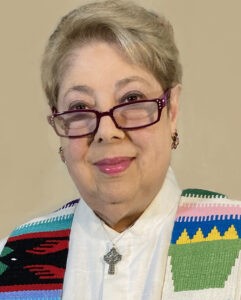Have you noticed that some Christians behave as if they are against Christianity?
I wonder if the people around us see our brand of Christianity as something they don’t need or want in their lives. For example, in 2018 and 2019, Pew Research found that the 65% of American adults who describe themselves Christian is down 12 percentage points over the past decade. During the same time period, those who identify as religiously unaffiliated — people who describe their religious identity as agnostic, atheist, nothing in particular, or “nones” — grew to 26%, up from 17% in 2009.

Kathy Manis Findley
Perhaps the “nones” have been watching us and simply reject what they observe about Christianity. For good or ill, the practice of faith the world sees informs their opinions about Christians, Christian churches and Christianity as a whole.
Christians behaving badly
These days, close observers usually can see Christian people behaving badly on television and pundits giving unfavorable descriptions of their behavior. In addition to the earlier percentages, we ought to also consider other percentages — like what percentage of the participants in the Jan. 6 insurrection at the U.S. Capitol identify as evangelical Christians. While we hope people would “know we are Christians by our love,” they may recognize us instead by what looks like broken faith and the tendency to act as if we are against the Christianity we profess.
Christian activist Lisa Sharon Harper, in her book Fortune: How Race Broke My Family and the World — and How to Repair It All, makes this point: “Any attempt to repair what race broke in our nation must contend with what race broke in our faith.” Her book raises a timely discourse about faith, justice and Christianity.
We live in perilous times when injustice still ravages our society and its people, Christians divide themselves into self-created camps on the right and on the left, and faith gets lost in the chasm of divisive actions and rhetoric. Many people seem determined to create deep social fractures, and Christian faith that once was strong and steadfast is, in these days, suffering from a loss of focus on its divine epicenter.
Survey the theo-ethical landscape
If we are wise, we will explore the effect the current theo-ethical landscape in the United States has on our faith.
We can argue that the core of Christian faith begins in the first public pronouncement of the ministry of Jesus as presented in Luke’s Gospel. These unambiguous words of Jesus are the central principles of his faith, his manifesto for righteous living.
The Spirit of the Lord is upon me, because he has anointed me to bring good news to the poor. He has sent me to proclaim release to the captives and recovery of sight to the blind, to let the oppressed go free, to proclaim the year of the Lord’s favor. (Luke 4: 18–19)
“Before anything else, Jesus issued a mandate for justice.”
Before anything else, Jesus issued a mandate for justice. A mandate from Jesus is not merely a suggestion for the faithful, it is a divine commission that points back to faith’s foundation. Yet some Christians shamelessly involve themselves in actions and debates that make them look as though they are against Christianity altogether. Perhaps all Christians behave this way at times.
In the compelling book Christians Against Christianity: How Right-Wing Evangelicals Are Destroying Our Nation and Our Faith, Obery M. Hendricks invites readers to consider our heritage of faith in light of the image that many who claim to be evangelicals paint on the landscape. Hendricks describes “justice-minded 18th- and 19th-century evangelicals” as a people whose faith revealed an “attention to the needs of the people … stands against racial injustice, economic exploitation, and political corruption … trying to be faithful to the biblical dictum of ‘love your neighbor as yourself.’”
He suggests these people of faith sought resolutely to incorporate justice into American society and argues their legacy left this nation on solid moral ground and with social principles of justice at the forefront of their Christian witness.
A history of injustice
Of course, as we consider the 18th and 19th centuries, we must do so against the backdrop of a long history of injustice. Followers of Christ have at times deliberately, or at least inadvertently, contributed to the long arc of injustice. To contrast the 18th- and 19th-century evangelicals with present day, self-proclaimed “evangelicals” would be a disheartening exercise.
Many present-day evangelicals have chosen to operate in their own world while holding fast to a worldview that condones violent insurrection, demonizes certain groups of people, interferes in the role of government and denounces Christ’s call to define neighbor as everyone. They have co-opted the term “evangelical,” revisioned the description of an “evangelical,” and now portray to the world that “Christians” can act as if they are against authentic Christianity.
“We are inheritors of centuries of social injustice, and every Christian plays a part in the brokenness.”
We are inheritors of centuries of social injustice, and every Christian plays a part in the brokenness. That indictment hits close to home in that all of us fail to live up to Christ’s vision of faith. In ways large and small, we view justice as an unreachable pinnacle. Our history must be owned, in that we cannot simply continue to say, “l am not like that unenlightened Christian! I would never do or say that! I do not discriminate against people who are not like me.”
Harper compellingly describes the history of injustice that remains a present reality:
The varying perceptions of the Christian story divided our nation in antebellum times into two main camps: those who reconciled slavery and those who opposed slavery, both based on biblical teachings. Different interpretations of the Christian story divided our nation in the days of Jim Crow and the Civil Rights movement and culminated in the days leading up to the 2020 election when, in the face of racially disparate death rates due to COVID-19, Mayor Muriel Bowser, a Christian, ordered that “Black Lives Matter” be permanently painted on the street leading to the White House. And on January 6, 2021, the story of the ordained rule of white Christian men fueled an attempted coup and killed at least five images of God.
I cannot unpack her words any more eloquently than she wrote them. Instead, I would suggest that an interpretation of her words points an accusing finger in our direction.
Almost three-quarters of Americans identify themselves as followers of Jesus, but how are we labeled or categorized? More importantly, how do we uncategorize ourselves so that we may demonstrate to the world one unified message of Christian faith? How can we bring disparate, competing narratives of faith together in hopes of eliminating the breaches that divide Christians into human-devised religious and political camps?
“More importantly, how do we uncategorize ourselves so that we may demonstrate to the world one unified message of Christian faith?”
In light of such divisiveness, we must examine the beliefs of our faith, each person in their own way, interrogating and examining what we believe at our core. If we can do this, while sitting at the feet of those who first wrote and read and lived the biblical texts, perhaps all of us — Black, brown, white, LGBTQ persons, evangelicals, white suprematist evangelicals and plain old Christians — can show the world the faith of a Christ-follower.
Biblical evangelicalism
William J. Barber, president of the social justice organization Repairers of the Breach, defines what he calls biblical evangelicalism and its ethics. He denounces an extremist philosophy of hate, classism, greed, racism, misogyny, ageism and xenophobia, while proclaiming the authentic evangelicalism of loving the neighbor.
Evangelicalism has not always been led by right-wing reactionaries disdainful of the “other.” As Hendricks explains, “Evangelicals were once dedicated to championing the poor, the vulnerable and the socially marginalized rather than demonizing every person that did not look or believe as they did. In fact, about 50 years after its mid-18th-century beginnings, evangelicalism had become one of the most progressive social forces in America.”
If we who are followers of Christ dare to attempt the repair of what divisive hostility has broken in our nation, we must also contend with what divisive hostility has broken in our faith. What happens in society — violence, racism and all other isms, injustice in all its forms — deeply affects our brokenness, individually and collectively.
“We must also contend with what divisive hostility has broken in our faith.”
As I write this, April’s National Child Abuse Prevention Month and Sexual Assault Awareness Month invite me to act and to lament. Perhaps Lent is the season that urges us to see the violence that assails this scorched earth and contributes to the brokenness of our faith. Perhaps during Lent, our repentant prayer will be for an end to violence and hate, for love and acceptance, for justice, for hope.
Among other Lenten practices of prayer, fasting and repentance, we also clearly hear the call of Christ to give ourselves to those “love your neighbor” things that truly matter, those things that continue to shout out hope — right now — in this month that also commemorates the National Month of Hope.
We are still evangelicals
My hope is that we will refuse to allow others to co-opt who we are and what we call ourselves. If folk tend to label you “liberal,” wear your label in solidarity and compassion, but don’t give up on the good and holy word “evangelical.” Truth is, I always have liked the label “liberal, evangelical Christian.”
I wore the label to Fort Portal, Uganda, East Africa, where my husband and I served as missionaries. We made our home there, met strangers and made them friends. We went to care for the Ugandan people, to share with them abundant life, and to talk about Jesus. It was an evangelical mission, really, just as Christ’s commission to proclaim gospel good news. Without a single political consideration, and with no extra labels attached, I like to say that I have been an evangelical Christian, pure and simple. I still am.
“If folk tend to label you ‘liberal,’ wear your label in solidarity and compassion, but don’t give up on the good and holy word ‘evangelical.”’
If we accept Christ’s commission, we are among Christ followers who share the gospel, the euangelion. We are evangelicals — evangelicals sans politics, evangelicals without labels, evangelicals without meanness, evangelicals who love Christianity. We are evangelicals because evangelizing is an important part of our heritage.
Since society seems perplexed about the definition of “evangelical” and who exactly is one, here is some enlightenment about it:
Evangelical: one who bears the gospel, brings good news, good tellings, good message, glad tidings. In the Greek New Testament, euangelion (εὐαγγέλιον).
Jesus went throughout all Galilee, teaching in their synagogues and proclaiming the gospel (euangelion | εὐαγγέλιον |) of the kingdom and healing every disease and every sickness among the people. — Matthew 4:23
Shouldn’t we all lay claim to this label? After all, the Christ we follow was an evangelical, too. He traveled dusty roads, stopped along the wayside to talk with all kinds of people with all kinds of labels, healed folks who were suffering. And he called some people to leave their homes and their ways to follow him.
That’s the portrait of a Christian calling that inspires us never to act as though we are against Christianity, never to accept a broken faith, and always to stand on our heritage of living hope.
Kathy Manis Findley is an ordained Baptist minister with Greek Orthodox roots. Now retired in Macon, Ga., she spent her 38-year ministry serving as a pastor, hospital chaplain, trauma counselor and missionary to Uganda. She is a graduate of Southern Baptist Theological Seminary and is certified in victimology, trauma intervention and child forensic interviewing. She is the author of two serious books, Voices of our Sisters and The Survivor’s Voice: Healing the Invisible Wounds of Violence and Abuse, and just for fun, one Kindle novel.
Related articles:
How the evangelical church messed up and lost its way | Opinion by Terry Austin
Who are you? Non-Trumpist evangelicals struggle to be identified
Undoing the conservative evangelical in me | Opinion by Amber Cantorna
The deconstruction of American evangelicalism | Opinion by David Gushee
Three words of hope for the church in transition | Opinion by Mark Wingfield


